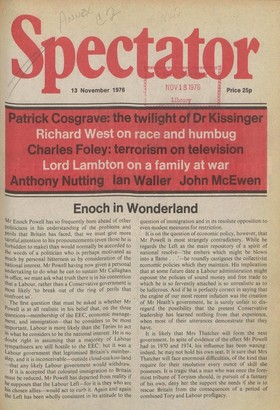Enoch in Wonderland
Mr Enoch Powell has so frequently been ahead of other Politicians in his understanding of the problems and Perils that Britain has faced, that we must give more careful attention to his pronouncements (even those he is forbidden to make) than would normally be accorded to the words of a politician who is perhaps motivated as Much by personal bitterness as by consideration of the national interest. Mr Powell having now given a personal Undertaking to do what he can to sustain Mr Callaghan Ill office, we must ask what truth there is in his contention that a Labour, rather than a Conservative government is Most likely to break out of the ring of perils that confront us'.
The first question that must be asked is whether Mr Powell is at all realistic in his belief that, on the three questions—membership of the EEC, economic manage'Rent, and and immigration—that he considers to be most Miportant, Labour is more likely than the Tories to act In what he considers to be the national interest. He is no doubt right in assuming that a majority of Labour Sympathisers are still hostile to the EEC: but it was a Labour government that legitimised Britain's membership, and it is inconceivable—outside cloud-cuckoo-land --that any likely Labour government would withdraw. II it is accepted that coloured immigration to Britain Must be reduced, Mr Powell has departed from reality if he supposes that the Labour Left--for it is they who are h15 chosen allies—would act to curb it. Again and again the Left has been wholly consistent in its attitude to the question of immigration and in its resolute opposition to even modest measures for restriction.
It is on the question of economic policy, however, that Mr Powell is most strangely contradictory. While he regards the Left as the main repository of a spirit of national resolve--'the embers which might be blown into a flame . . .'—he roundly castigates the collectivist economic policies which they maintain. His implication that at some future date a Labour administration might espouse the policies of sound money and free trade to which he is so fervently attached is so unrealistic as to be ludicrous. And if he is perfectly correct in saying that the engine of our most recent inflation was the creation of Mr Heath's government, he is surely unfair to disregard the possibility that the present Conservative leadership has learned nothing from that experience, when most of their utterances demonstrate that they have.
It is likely that Mrs Thatcher will form the next government. In spite of evidence of the effect Mr Powell had in 1970 and 1974. his influence has been waning: indeed, he may not hold his own seat. It is sure that Mrs Thatcher will face enormous difficulties, of the kind that require for their resolution every ounce of skill she possesses. It is tragic that a man who was once the foremost tribune of Toryism should, in pursuit of a fantasy of his own, deny her the support she needs if she is to rescue Britain from the consequences of a period of combined Tory and Labour profligacy.


































